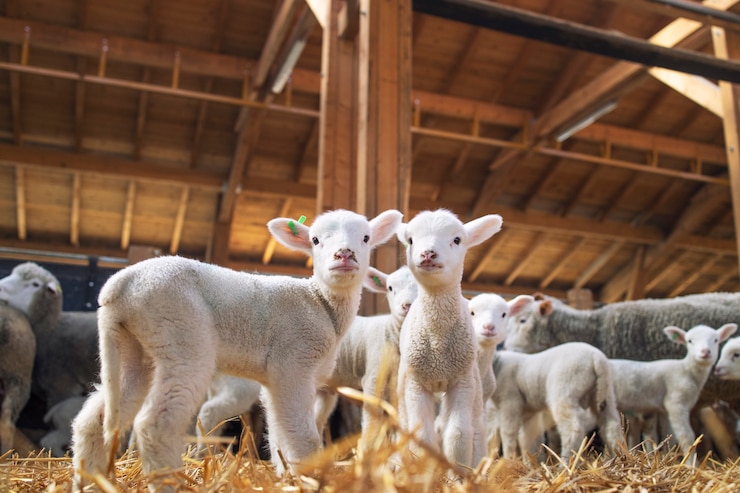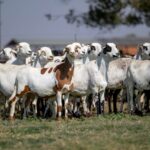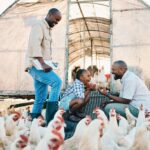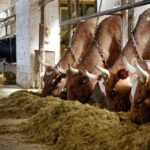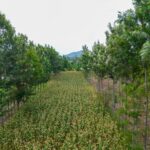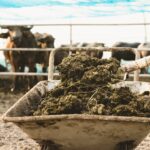Livestock farming plays a vital role in South Africa’s agricultural sector, contributing to food production, rural employment, and economic growth. With its diverse climate and abundant natural resources, South Africa offers a range of livestock farming options. In this article, we will explore some of the popular livestock farming options in the country, highlighting their characteristics and potential benefits.
- Cattle Farming: Cattle farming is one of the most common and economically significant livestock farming options in South Africa. Both beef and dairy farming are prevalent, with various cattle breeds suited to different regions. Beef farming focuses on producing high-quality meat, while dairy farming involves milk production for commercial purposes.
- Sheep Farming: Sheep farming is another popular option in South Africa, particularly in regions with favorable grazing conditions. Sheep farming offers multiple benefits, including meat production (lamb and mutton), wool production, and the potential for breeding and selling high-quality sheep.
- Goat Farming: Goat farming has gained attention due to its adaptability, low-input requirements, and high meat and milk production potential. Goats can thrive in various climates and are resilient to harsh conditions. Goat farming can be a profitable venture, offering opportunities for meat production, dairy products, and value-added products like goat cheese.
- Poultry Farming: Poultry farming, including chicken and turkey farming, is a highly profitable and rapidly growing sector in South Africa. With a high demand for poultry products, both for meat and eggs, poultry farming offers excellent market potential. Broiler chicken farming for meat production and layer chicken farming for egg production are popular options.
- Pig Farming: Pig farming, also known as swine farming, has seen significant growth in South Africa. It offers opportunities for pork production and provides a source of income for small-scale farmers. Pig farming requires specialized management, including housing, feeding, and disease prevention, but it can be a lucrative venture.
- Ostrich Farming: Ostrich farming is a unique livestock farming option that has gained attention in South Africa. Ostriches are primarily raised for their meat, feathers, and leather products. Ostrich meat is lean and sought after, while their feathers are used in various industries. Ostrich farming requires specific infrastructure and management practices to ensure the well-being of these flightless birds.
- Beekeeping: Beekeeping, or apiculture, offers an alternative form of livestock farming in South Africa. Beekeeping involves the management of bee colonies for honey production, beeswax, pollen, and other bee-related products. Beekeeping not only provides honey and bee products but also plays a crucial role in pollination and ecosystem health.
- Rabbit Farming: Rabbit farming is a niche livestock farming option gaining popularity in South Africa. Rabbits are known for their fast growth rate, high reproductive capacity, and efficient feed conversion. Rabbit farming can be a viable option for meat production and offers opportunities for value-added products like fur and manure.
- Game Farming: Game farming involves the breeding and management of wildlife species for various purposes, including meat production, trophy hunting, ecotourism, and conservation. South Africa’s vast landscapes and biodiversity make it ideal for game farming, with species such as antelope, wildebeest, and buffalo being commonly farmed.
- Aquaculture: Aquaculture, or fish farming, has seen significant growth in South Africa as an alternative livestock farming option. Fish farming in freshwater or marine environments can produce fish for human consumption, ornamental fish for the pet trade, or even fish for stock enhancement in recreational fishing areas.
South Africa offers a wide range of livestock farming options, each with its unique requirements and potential benefits. The choice of livestock farming should consider factors such as market demand, local resources, climate suitability, and personal interests and skills. Before embarking on any livestock farming venture, thorough research, proper planning, and an understanding of the specific farming practices and management requirements are essential for success in this dynamic sector.
Image by aleksandarlittlewolf on Freepik
Join 'Farmers Mag' WhatsApp Channel
Get the latest Farming news and tips delivered straight to your WhatsApp
CLICK HERE TO JOIN
